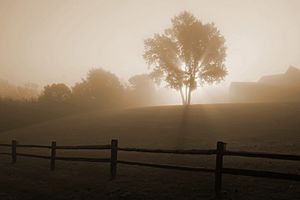Visibility facts for kids
Visibility is a term used in meteorology, which is the study of weather. It describes how far a person can see clearly through the air. When visibility is low, like during a blizzard or heavy fog, it's hard to see very far. But on a clear, sunny day, visibility is high, and you can see things a long way off.
Contents
What is Low Visibility?
When visibility is less than about 100 metres (330 ft), it's often called "zero visibility." This means you can barely see anything in front of you. In such conditions, roads might be closed for safety. Special lights and signs are often turned on to warn drivers in areas that frequently have very low visibility. These warnings help prevent car accidents. Without them, crashes involving many cars can happen.
What is Good Visibility?
Visibility is considered good when you can see farther than about 10 kilometers. This usually happens on clear days with no fog, heavy rain, or snow. When visibility is good, it's safer and easier to travel, whether by car or plane.
Weather Warnings for Low Visibility
Meteorologists often issue special warnings, called advisories, when low visibility is expected. For example, the U.S. National Weather Service might put out a "dense fog advisory." These advisories tell drivers to avoid travel until the fog clears. Low visibility can also cause delays at airports, slowing down or stopping flights for safety reasons.
Images for kids
-
Foggy morning road
See also
 In Spanish: Visibilidad para niños
In Spanish: Visibilidad para niños
 | Bayard Rustin |
 | Jeannette Carter |
 | Jeremiah A. Brown |




